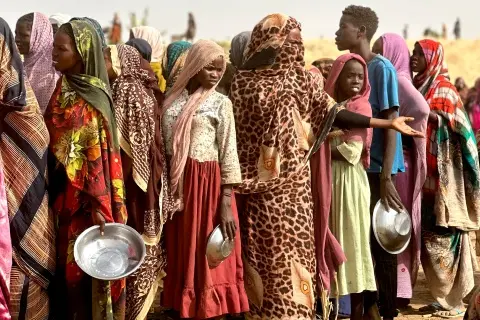The recent attacks on civilians in western Sudan have raised urgent concerns among human rights organizations, calling for immediate intervention by the United Nations Security Council. The Rapid Support Forces (RSF) have been accused of carrying out unlawful attacks on civilians, including those in displaced persons camps, leading to a dire humanitarian crisis in the region.
The Security Council has been urged to pressure the RSF to halt these attacks and allow humanitarian aid to reach those in need. Additionally, there are calls for the arms embargo on Darfur to be expanded to cover the entire country, and for sanctions to be imposed against the warring parties’ leadership for violations of international humanitarian law.
Recent reports have highlighted the severe impact of the ongoing conflict on civilians, with many facing starvation due to the blockade of aid. The RSF’s siege on El Fasher has prevented essential supplies from reaching the city, leading to a sharp increase in prices and forcing residents to resort to eating animal fodder.
Despite calls from the UN Security Council to end the siege and allow access for aid, concrete action has yet to be taken. The situation in El Fasher remains critical, with reports of civilians being targeted and aid convoys being attacked.
It is crucial for the international community to come together and address the dire situation in western Sudan. The Security Council must take decisive action to protect civilians, hold the warring parties accountable for their actions, and ensure that humanitarian aid reaches those in need. The lives of countless innocent people depend on swift and effective intervention to end the violence and suffering in the region. The ongoing conflict in Sudan has resulted in indiscriminate killings and executions of civilians, including healthcare workers. Reports from Médecins Sans Frontières (Doctors without Borders or MSF) have revealed systematic patterns of violence targeting non-Arab communities, particularly ethnic Zaghawa. Civilians fleeing the violence have faced pillaging, sexual violence, and attacks on their infrastructure.
The situation in El Fasher and Zamzam has been dire, with civilians being forced to dig foxholes to protect themselves from shelling and bombings. Those attempting to flee have been subjected to further abuse, including shootings and injuries. Checkpoints manned by RSF fighters and armed Arab militia have led to the pillaging of belongings and the rape of women and girls.
The Sudan International Nongovernmental Organizations Forum has warned of the dangers faced by civilians trying to escape the violence, with roads blocked and attacks at checkpoints. The need for safe passage out of the city is crucial, as well as the provision of food and medical supplies to those in need.
In the Kordofan region, airstrikes by the Sudanese Armed Forces have hit civilian infrastructure and displaced persons sites, leading to civilian casualties. The fighting has also resulted in severe food shortages, with communities in El Fasher and the Nuba mountains facing starvation.
The UN Security Council must assess the effectiveness of civilian protection measures and renew the arms embargo on Sudan. Sanctions should be enforced, and violators held accountable for their actions. The idea of deploying a protection-of-civilians mission to Sudan should also be considered to ensure the safety and well-being of civilians in the region.
As the conflict in Sudan continues to escalate, it is imperative that concrete actions are taken to protect civilians and hold those responsible for the violence accountable. The international community must come together to support peace efforts and provide assistance to those in need. the perspective of a small business owner who has successfully pivoted their business during the COVID-19 pandemic.
As a small business owner, navigating the challenges brought on by the COVID-19 pandemic has been a rollercoaster of emotions and decisions. When the pandemic hit and the lockdowns began, I knew that I had to think quickly and adapt in order to keep my business afloat.
One of the first steps I took was to evaluate my current business model and identify areas that needed to change in order to survive in this new landscape. This meant re-evaluating our product offerings, marketing strategies, and customer communication channels.
One of the most successful pivots we made was shifting our business online. With the closure of our physical storefront, we quickly set up an e-commerce website and began promoting our products through social media and email marketing. This not only allowed us to continue serving our loyal customers, but also opened up new opportunities for reaching a wider audience.
In addition to going digital, we also diversified our product offerings to meet the changing needs of our customers. We began offering new services such as curbside pickup and delivery, as well as introducing new products that were in high demand during the pandemic.
Another key pivot we made was focusing on building strong relationships with our customers. We started offering virtual consultations and personalized shopping experiences to ensure that our customers felt supported and valued during this difficult time. This not only helped us retain existing customers, but also brought in new business through word-of-mouth referrals.
Overall, the pandemic has been a challenging time for small businesses, but by being willing to adapt and pivot, we have been able to not only survive, but thrive in this new normal. It has been a learning experience that has taught us the importance of flexibility, innovation, and resilience in the face of adversity. And while the future remains uncertain, I am confident that our business is well-equipped to weather whatever challenges may come our way.








